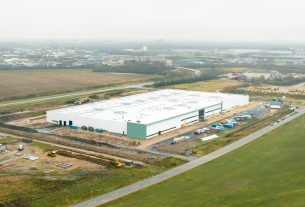United Kingdom – The UK government contributes fresh cash to encourage the generation of clean energy in the country.
The funding announced today includes £77 million to increase nuclear fuel production and support the development of the next generation of advanced nuclear reactors, as well as £25 million for technologies that can produce hydrogen from sustainable biomass and waste while removing carbon dioxide from the atmosphere.
Nuclear investment
The government has committed to new and innovative nuclear energy with the announcement of funding worth up to £60 million to begin the next phase of research into the cutting-edge high temperature gas reactor (HTGR), a type of advanced modular reactor (AMR), which could be operational by the early 2030s. Thanks to funding from the Advanced Modular Reactor R&D program, a demonstration project of the engineering design is anticipated to be operational by the end of the decade.
HTGRs are typically more adaptable, more compact, and less expensive to build than conventional nuclear power stations. By lowering the UK’s reliance on expensive fossil fuels and by producing byproducts like low-carbon hydrogen, HTGRs are expected to strengthen the country’s energy security and sovereignty in addition to producing electricity that can be used to securely power homes. By producing temperatures of up to 950 degrees, HTGRs provide a source of clean, high temperature heat that could help decarbonize industrial processes in the UK.
The funding for HTGR innovation is supported by an additional £4 million in funding for the AMR Knowledge Capture Effort, a side project to the AMR Research, Development, and Demonstration initiative. The initiative aims to enhance information collection and sharing to speed up, reduce risk, and lower the cost of delivering the program.
Additionally, Preston’s Westinghouse, which plays a crucial strategic role in producing fuel for the current fleet of sophisticated gas-cooled reactors in the UK, will get up to £13 million in support. The funds will help the company build the capacity to generate new fuel using both reprocessed and freshly mined uranium, enabling the UK to become less dependent on imports from elsewhere. Hundreds of highly skilled jobs at the Lancashire-based Westinghouse Springfields factory will be preserved because to this major investment.
In addition to expanding the industry’s export opportunities and establishing the UK as a prominent global supplier of nuclear fuel and fuel cycle services, ministers predict that it would improve the UK’s energy security.
A fortnight earlier, officials had announced that Sizewell C in Suffolk would receive a historic £700 million investment from the state, marking the first time in more than 30 years that a nuclear project would receive state funding. The power facility will produce enough electricity for 6 million homes over the course of more than 50 years.
Hydrogen technology
In addition to the government’s efforts to increase the use of nuclear and renewable energy sources in order to improve the country’s energy security, expanding the use of hydrogen, which is destined to become a superfuel of the future, will be crucial to the UK’s transition to a cleaner energy future.
The government has committed £25 million to accelerating the adoption of BECCS, a cutting-edge “negative emission” technology that creates hydrogen from bioenergy and can permanently remove CO2 from the atmosphere. As biomass grows, it absorbs CO2, which is then trapped and permanently stored during the production of hydrogen.
Hydrogen BECCS technologies will be essential for the UK’s transition to net zero emissions because they will provide hydrogen as a clean fuel for hard-to-decarbonize sectors including transportation and heavy industry. The funding made public today will help BECCS projects go from the design to demonstration stages, paving the way for future integration of the technology into our current energy system.
The government is launching a number of initiatives, such as this program, as part of the UK’s green industrial revolution to develop a thriving low-carbon hydrogen sector.
The proposals made today also include steps to increase the efficiency standards for new gas boilers, which might lessen the reliance of homes on expensive fossil fuels and lead to cheaper energy prices. As we approach the phase-out of new and replacement natural-gas-only boilers in 2035, carbon emissions will be decreased through boosting boiler efficiency. The hypothesis states that by 2050, it is possible to prevent 21 million tonnes of CO2, which is equivalent to taking roughly 9 million automobiles off the road for an entire year.
The government is also seeking input on a proposal that would mandate that all new domestic-scale gas boilers sold beginning in 2026 be capable of being fueled by hydrogen in order to be prepared for any potential future transition to the use of low-carbon hydrogen for heating.




